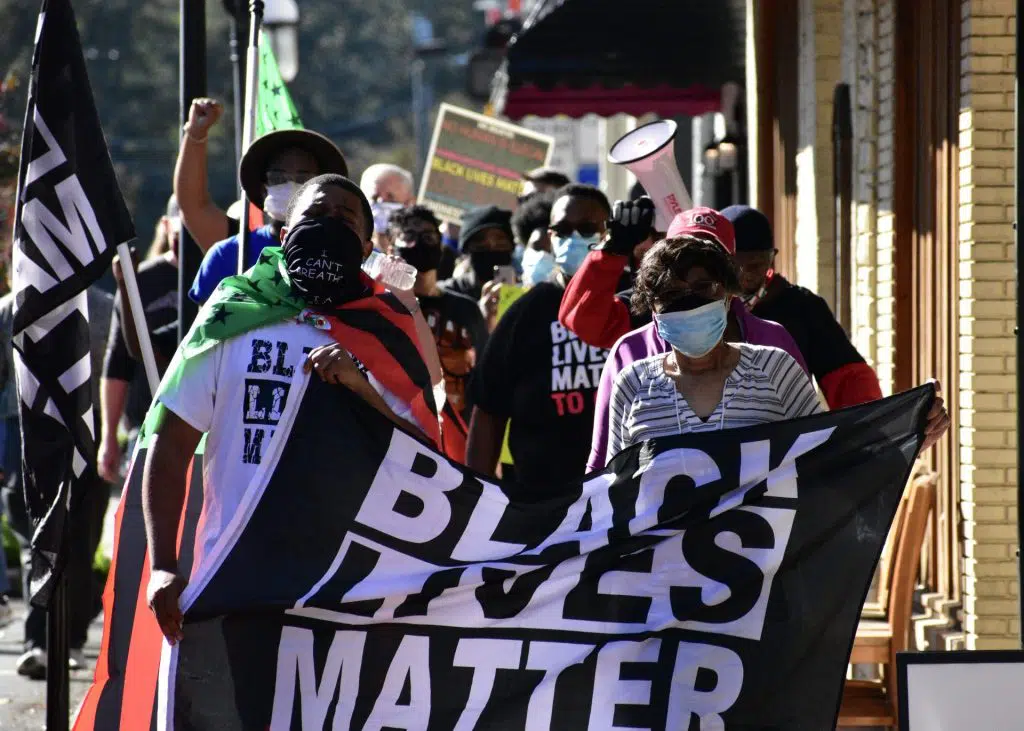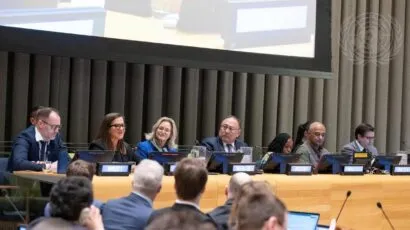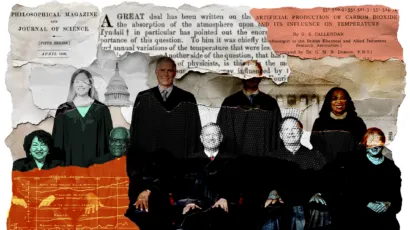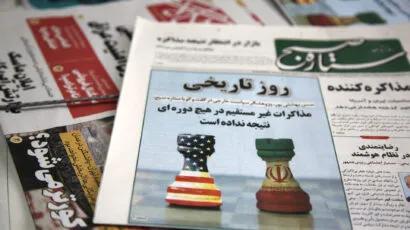An online pandemic: disinformation targeted at Black communities
By Angela R. Pashayan | October 27, 2021
 Black Lives Matter demonstrators. Credit: Anthony Crider. CC BY 2.0.
Black Lives Matter demonstrators. Credit: Anthony Crider. CC BY 2.0.
Online disinformation offers a way to influence society without relying on physical methods for results. Why tamper with voting machines, when you can amplify the idea that voting machines were tampered with? From Kremlin operatives behind disinformation campaigns targeting the 2016 and 2020 US presidential elections to the US-based organizers of the Stop the Steal movement seeking to overturn the results from 2020, bad actors know the power of disinformation. And they know there’s no better way to plant disinformation in the social media bloodstream than by appealing to the deepest parts of identity—for example, a person’s racial or cultural identity.
Black communities are repeatedly targeted for online disinformation and used as a tool to stir discord related to America’s longstanding racial divides. The targeting is likely to continue unless the US government acts on its apparent resolve to do something about the manipulation of US citizens. Moreover, time is running out; the 2022 and 2024 elections are right around the corner.
Whether targeted by Russia, other adversary countries, or domestic actors, Blacks in the United States continue to be a focus of disinformation efforts. The target is not small: According to a Pew Research poll in April 2021, 77 percent of Black Americans use at least one social media site daily for information, a slightly higher figure than the 72 percent of US adults and 69 percent of whites who do the same. Recent social media campaigns have targeted Blacks in three general subject areas: They have attempted to mislead Black communities about the COVID-19 vaccine, deterring Blacks from feeling safe about receiving it. They have also focused on the massive Black Lives Matter (BLM) protests following the murder of George Floyd, attempting to stir white anger toward the movement. And they have tried to suppress Black election turnout and heighten white anxiety.
Disinformation aimed at the Black community has come from many sources. But investigations have documented major Russian disinformation campaigns in the 2016 and 2020 elections that directly targeted Blacks. Russia-linked operatives went to astonishing lengths to do this. Researchers affiliated with Eberhard Karls Universität Tübingen in Germany looked at Twitter profiles that were disguised as being American, but actually originated in Ghana and other West African countries. The accounts, which tweeted between 2017 and 2020, were eventually removed by Twitter, in a measure to protect the public. The account posts focused on a range of topics—from Black achievement to police brutality— “to cultivate followers and manipulate US narratives about race, racial tensions and police conduct,” the researchers wrote in The Washington Post. According to a US intelligence community assessment released in March, Russia put together a complex disinformation campaign during the elections in part by using social media personas to amplify divisions in the United States.
Disinformation targeting the BLM movement deflated support for the protests. Jorden Giger, an organizer for BLM in South Bend, Ind., told NPR last May that the disinformation characterizing protests as lawless was intentionally spread to sap participation. He cited posts suggesting that activists would “break windows or otherwise incite violence.”
“Seeing that sort of information makes BLM supporters say, ‘OK, I don’t want to get involved in that.’ Right?” he said. “So when those kinds of lies and when the disinformation just goes unchecked, you know, folks will believe it, if you don’t get ahead of it or respond to it appropriately.”
When the pandemic struck, those spreading misinformation and disinformation about COVID-19 clearly targeted Black communities. Brandi Collins-Dexter, a visiting fellow at Harvard Kennedy School’s Shorenstein Center on Media, Politics and Public Policy analyzed the four primary dis/misinformation posts being spread in the Black community:
- Black people could not die from COVID-19.
- The virus was man-made for the purposes of population control.
- The virus could be contained by taking herbal remedies.
- 5G radiation was the root cause of COVID-19.
Disinformation contributes to discord, conspiracy beliefs, and social conditions that lead to greater political and social problems. If Blacks refrain from voting because of misinformation on the location or hours of polling stations, they could affect the outcome of US elections. If the majority of Blacks do not trust COVID-19 vaccines and refrain from being vaccinated, the Black population will be more at risk of death and also jeopardize the public health goal of reaching herd immunity. And, if misinformation and disinformation are not addressed by the government in a larger sense, America stands to be subject to continued disruptions that go beyond discord and lead to social and political chaos.
If foreign or domestic actors can use race to stir discord in America, then America has a security problem—one that will not be resolved until the country mends its historical racial divides. While fixing these will be an enormous challenge, addressing mis- and disinformation online, particularly on major social media platforms that aren’t doing enough to stem the tide of falsity, will help. The time to act is short; the next American election cycle has already begun.
Together, we make the world safer.
The Bulletin elevates expert voices above the noise. But as an independent nonprofit organization, our operations depend on the support of readers like you. Help us continue to deliver quality journalism that holds leaders accountable. Your support of our work at any level is important. In return, we promise our coverage will be understandable, influential, vigilant, solution-oriented, and fair-minded. Together we can make a difference.
Keywords: 2024 election, Black Lives Matter, COVID-19, Disinformation, vaccination
Topics: Biosecurity, Disruptive Technologies
















The major problem is mis and dis-information has taken hold not only in Black communities but non Black communities as well. It is completely out of hand and its grip is getting stronger. It has taken hold of the American fabric and I fear nothing can be done about it.
Please! Give. Black. people. more. credit!! Repeatedly, we’re telling anyone who pretends to listen that our concerns about the vaccine are the same concerns that many White people have. Namely, that former President Trump negotiated deals that resulted in the current vaccines, remedies that were created at lightning speed. It doesn’t take brainwashing to have us on guard about anything with his hand in it. That’s enough to give pause to many intelligent, reasonably cautious people of all ethnicities. So what if a high number of Black people were targeted on social media? A high number of White people were… Read more »
On top of that, disinformation campaigns steered black folks away from Bernie Sanders, despite his lifetime of championing racial justice.